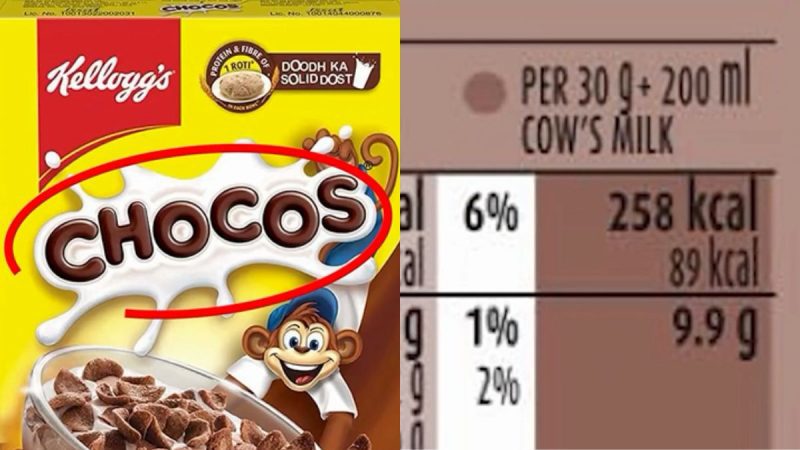Kellogg’s, a name synonymous with breakfast cereals, has found itself at the centre of a growing controversy surrounding its popular Chocos cereal and its inflated protein claims. A recent exposé by Instagram influencer Foodpharmer, otherwise known as Revant Himatsingka, has accused the company of misleading consumers about the cereal’s nutritional content.
Kellogg’s Chocos Inflated Protein Claims
View this post on Instagram
The crux of the issue lies in the cereal’s nutrition label. Kellogg’s boldly proclaims a protein content of 9.2 grams per serving. However, Himatsingka claims this figure is deceptive. A closer examination reveals that only 2.7 grams of protein actually originate from the Chocos cereal itself. The remaining 6.5 grams come from the recommended serving of milk, a detail conveniently omitted from the prominent label.
This revelation has sparked outrage among consumers and health experts alike. By including the nutritional value of milk in the cereal’s label, Kellogg’s has effectively inflated the product’s protein content, creating a misleading impression of its nutritional worth. This tactic is particularly concerning given the cereal’s target audience, which includes many children.
The impact of this deception extends beyond the realm of nutrition. Cereal is often marketed as a healthy breakfast option, especially for children. By falsely promoting Chocos as a protein-rich food, Kellogg’s contributes to the pervasive misconception that sugary cereals are a wholesome start to the day. This can have detrimental consequences for children’s dietary habits and overall health.
Implications Of Misleading Information
View this post on Instagram
Foodpharmer’s exposé highlights a broader issue within the food industry: the importance of clear and accurate labelling. Consumers rely on nutritional information to make informed choices about the products they consume. When companies engage in deceptive practices, they erode consumer trust and undermine the very foundation of healthy eating.
The responsibility for ensuring accurate labelling lies primarily with food manufacturers. However, regulatory bodies also play a crucial role in preventing such misleading practices. Stricter guidelines and penalties for false or deceptive claims are essential to protect consumers.
Beyond the regulatory framework, consumers themselves must remain vigilant. By questioning the claims made on food packaging and seeking out reliable sources of nutritional information, individuals can make more informed decisions about their diet.
Also Read: Paris Olympics Turns Vegan To Reduce Carbon Footprint & Reduce Animal Protein Consumption
Kellogg’s has yet to issue a formal response to the allegations levelled against it. The company faces a significant challenge in repairing its reputation and regaining the trust of its consumers. The outcome of this controversy will undoubtedly have far-reaching implications for the food industry as a whole.
Cover Image Courtesy: @foodpharmer/ Instagram
For more such snackable content, interesting discoveries and the latest updates on food, travel and experiences in your city, download the Curly Tales App. Download HERE. First Published: July 30, 2024 11:40 AM




